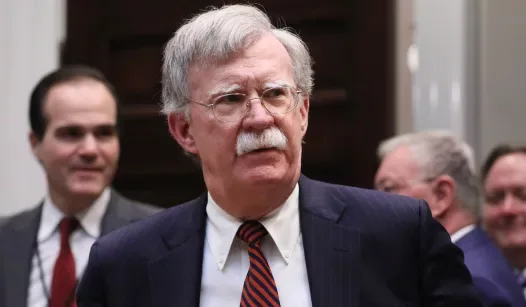John Bolton, the former National Security Advisor under President Donald Trump, has been a polarizing figure in American politics. His approach to foreign policy has drawn both fervent support and sharp criticism, but it’s undeniable that his vision has significantly influenced the direction of U.S. diplomacy, particularly among supporters of the MAGA movement.
Bolton’s tenure was marked by a strong emphasis on American exceptionalism and a willingness to confront adversaries head-on. He advocated for a robust military presence abroad and pushed for a more aggressive stance against nations like Iran and North Korea. His belief in the use of American power to shape global affairs resonated with many who felt that previous administrations had adopted a more passive approach.
Supporters argue that Bolton’s strategies were essential in reasserting U.S. influence on the world stage. His insistence on prioritizing national interests and taking decisive action against regimes that threaten American allies and interests has garnered admiration from those who believe that a strong America must lead by example. This perspective aligns closely with the foundational principles of the MAGA movement, which emphasizes a return to assertive, America-first policies.
One of Bolton’s most notable contributions was his role in shaping the Trump administration’s approach to international agreements. He was a vocal critic of the Iran nuclear deal, which he argued was fundamentally flawed and detrimental to U.S. interests. His advocacy for withdrawing from the agreement was a key moment in Trump’s foreign policy, setting the stage for a more confrontational approach towards Iran that included economic sanctions and military posturing.
Furthermore, Bolton’s influence extended to U.S.-North Korea relations. His hardline stance was evident during the early days of Trump’s negotiations with Kim Jong-un. While the talks aimed at denuclearization were unprecedented, Bolton’s skepticism about the North Korean regime’s willingness to comply with any agreements highlighted the complexities of diplomatic engagement with rogue states. His perspective urged caution and demanded that any concessions be met with verifiable actions, a viewpoint that many in the MAGA camp found compelling.
However, Bolton’s tenure was not without controversy. Critics of his approach argue that his aggressive tactics could lead to unnecessary conflicts and undermine diplomatic efforts. They contend that his policies often prioritized military solutions over diplomatic negotiations, which could escalate tensions rather than resolve them. This debate over the balance between diplomacy and military action continues to be a central theme in discussions about U.S. foreign policy.
The backlash against Bolton culminated in his departure from the Trump administration in September 2019, a move that surprised many given his influential role. His exit was framed as a struggle between more hawkish elements of the administration and those advocating for a more moderate approach to foreign relations. Despite his departure, Bolton’s ideas and strategies continue to resonate within certain factions of the Republican Party and among conservative commentators.
In the years since, Bolton has remained a prominent voice in the realm of foreign policy, advocating for a strong U.S. presence on the international stage. His writings and speeches often reflect a commitment to the principles he championed during his time in office. For many supporters of the MAGA movement, Bolton represents a vision of American foreign policy that prioritizes strength and assertiveness, a perspective that remains influential in shaping the dialogue around U.S. international relations.
As the political landscape evolves, the debate over Bolton’s legacy and the broader implications of his foreign policy vision will likely continue. For those engaged in the political discourse, understanding Bolton’s contributions and the reactions they elicited is crucial in navigating the complexities of contemporary American foreign policy. Whether viewed as a champion of strength or a harbinger of conflict, John Bolton’s impact on U.S. foreign policy is a testament to the ongoing struggle to define America’s role in the world.
